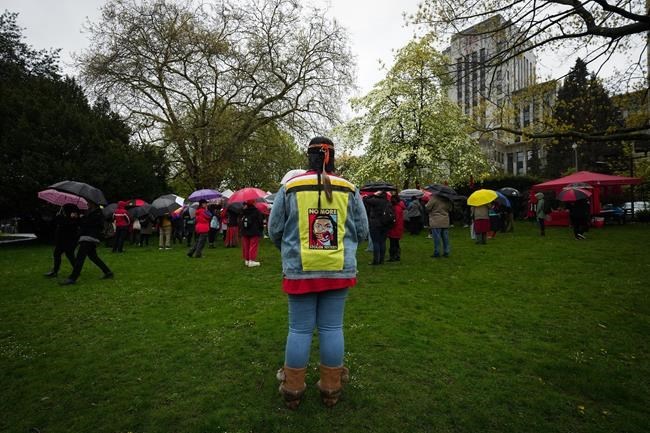
People attend a Red Dress Day ceremony marking the National Day of Awareness for Missing and Murdered Indigenous Women, Girls, and Two-Spirited people in Canada, in Vancouver, B.C., Thursday, May 5, 2022. Racism and the lack of primary care providers mean off-reserve First Nations, Métis and Inuit females have poorer health overall compared to their non-Indigenous counterparts, says a study by the Public Health Agency of Canada.THE CANADIAN PRESS/Darryl Dyck
August 27, 2023 - 9:05 PM
Racism and the lack of primary care providers mean off-reserve First Nations, Métis and Inuit women and girls have poorer health overall compared to their non-Indigenous counterparts, says a study by the Public Health Agency of Canada.
Compared with non-Indigenous females, those in the three distinct groups reported a higher prevalence of diagnosed chronic diseases and worse mental health, including mood or anxiety disorders, says the study, which noted Canada's colonial history of residential schools, forced or coerced sterilization and destruction of traditional lands.
Researchers used data for all females aged 15 to 55 from the annual Canadian Community Health Survey between 2015 and 2020. That amounted to 6,000 people from the three distinct groups and 74,760 non-Indigenous females, all in their reproductive years.
"Indigenous females waited longer for primary care, more used hospital services for non-urgent care and fewer had consultations with dental professionals," says the study, published Monday in the Canadian Medical Association Journal.
Lead researcher Sebastian Srugo said that while thousands of women across Canada lack a family doctor, "those conversations are happening much, much more among Indigenous women."
"Even when we compare Indigenous women and people assigned female at birth to non-Indigenous counterparts of a similar age, similar education, income and living in the same places, we still have those gaps," Srugo said.
Women who were pregnant or had just given birth were worse off, and that could affect their children years later, he said.
"This is about intergenerational impacts of not having access to this care," Srugo said. "It's also about a justifiable lack of trust that Indigenous communities have with the health-care system in Canada."
Primary care providers could support the women in their reproductive decisions and assess them for conditions including heart disease, depression and cancer, he said.
Multiple studies have connected poorer health outcomes for Indigenous females compared to the wider population.
But Srugo said the PHAC study adds to limited research involving First Nations, Métis and Inuit, which have diverse cultures, languages and histories but are typically lumped together as Indigenous Peoples.
The study included 2,902 First Nations, 2,345 Métis and 742 Inuit women and girls. Researchers also received input from an advisory committee specifically created for the project. Members were from four organizations — Les Femmes Michif Otipemisiwak (Women of the Métis Nation), the Native Women’s Association of Canada, Pauktuutit Inuit Women of Canada and 2 Spirits in Motion.
While Lee Clark, director of health for the Native Women's Association of Canada, lauded federal researchers for partnering with Indigenous organizations, she said their study should not become "one more paper in the pile of evidence" that has made little difference in the lives of women deprived of equitable care.
Researchers themselves cited the challenges in access to care in a "disjointed jurisdictional system, resulting in medical relocations for birthing and general health care."
Clark said she hoped the federal government would use the findings to "hold provinces accountable" to deliver targeted programs for women whose needs have been sidelined for too long.
Indigenous communities are still deeply affected by the 2020 death of Atikamekw woman Joyce Echaquan in a Quebec hospital, where she filmed staff insulting her as she lay dying, she said.
"The majority of people I speak with in the community, we have stories of blatant racism," she said from Gatineau, Que. "Colonialism isn't historic. It's ongoing. These harms are continuing and they're perpetuated still. Joyce's example is just one of the examples that was recorded."
In a decision earlier this month, anarbitration tribunal ordered the reinstatement of an orderly who was fired by the hospital. An arbitrator wrote that while the employee made inappropriate comments toward Echaquan, she was not responsible for most of the poor treatment the patient received compared to the "insulting, vulgar, racist and rude remarks and behaviour'' of a nurse. That nursewas also fired for telling Echaquan that she was stupid and "better off dead."
Clark also called on federal and provincial governments to work together to incorporate Indigenous practices in health care, including midwifery that uses traditional practices.
"Pockets of this is happening, recently in Nova Scotia. It needs to be everywhere. It needs to be more accepted. The medicalization of birth is just an outright stamp of colonialism."
This report by The Canadian Press was first published Aug. 28, 2023.
Canadian Press health coverage receives support through a partnership with the Canadian Medical Association. CP is solely responsible for this content.
News from © The Canadian Press, 2023